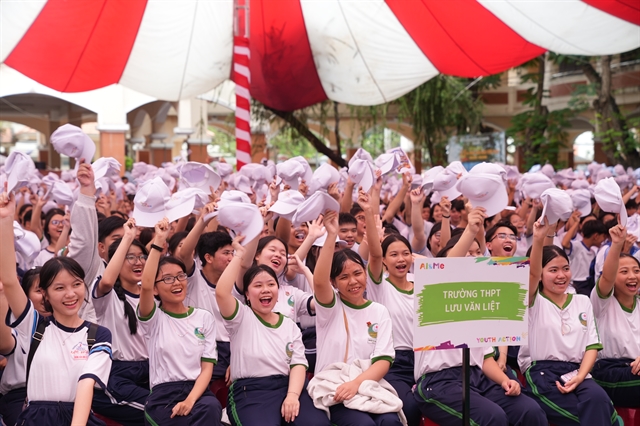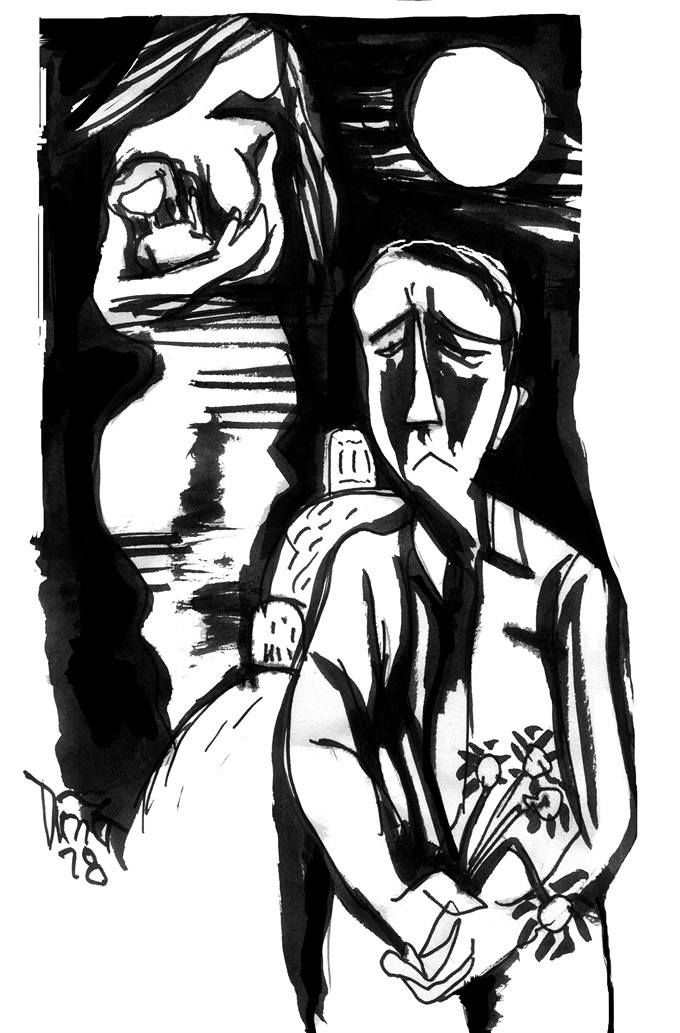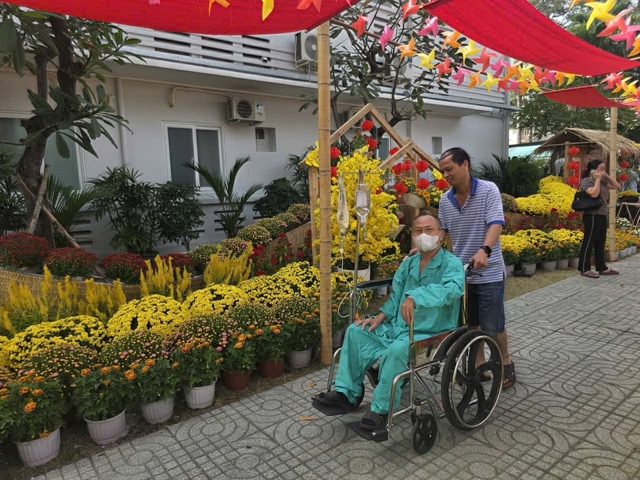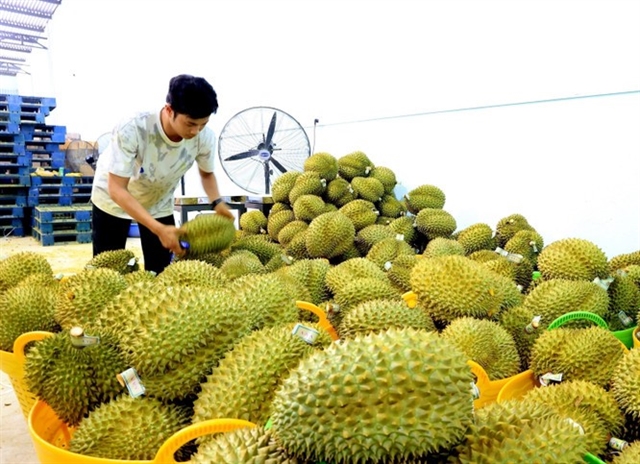

A short story by LÊ QUANG TRẠNG
 |
| Illustration by Đỗ Dũng |
by LÊ QUANG TRẠNG
Leaving his hometown for Hồ Chí Minh City, Hận brought me a lot of fried beef, fish paste and fruit. When he arrived at the dormitory of the College of Medicine, he sat outside the gate to wait for me.
“As a medical student, can you perform a blood transfusion?” Hận asked me abruptly instead of saying hello.
“Why not?” I answered with a hearty laugh. “But first what do you say to eating something?”
“Sure, I’m starving.”
He seemed in high spirits. I noticed his eyes were bright, a rarity for him.
“Is a transfusion difficult and expensive?” he asked when our snack was nearly over.
“My God! Why are you obsessed with this?” I said in an anxious voice, for I was fully aware that he was serious.
“Between you and me, I can hardly keep going on with the blood I have in my veins. I need better blood,” he replied sincerely.
“Blood isn’t like petrol,” I explained. “In general, we can’t do a transfusion without good reason. Only when someone is dying can we carry it out properly,” I emphasised.
“How about you transfuse fresh blood into my body when I die, before I’m buried?”
“How could I do that? When our heart stops beating, blood can’t circulate. And why will it matter when you’re dead?” I asked in a worried voice.
My words seemed to upset him. His eyes looked dim as if they had been blurred by a floating cloud.
“Well, what could be done?” he asked.
“Why do you want this when you’re perfectly healthy?”
“To the best of my knowledge, blood diseases are hereditary and in my veins there’s a criminal germ that was handed down from my ancestors,” he replied. “It will show itself sooner or later. Therefore, I must get rid of it to prevent it from threatening society.”
I stared at him for a long while. His eyes appeared senseless and soulless.
“I also know that when we donate our body to a scientific institution, it will be disemboweled and blood will be drained out of arteries then filled up with chemicals…,’ he went on.
“Quite right,” I said, laughing aloud.
After that I did not see him for a long time.
Not until many years later, on the last Friday of December, during a professional service in memory of Dr Macchabée** would I see him again in a tragic situation.
* * *
“I don’t know why you gave birth to a baby with such sorrowful-looking eyes?” Hận’s father one day grumbled to his wife who was mending her old clothes. She just looked at her little child without saying anything. Much later, by chance Hận, hiding himself behind the wooden screen between two rooms, eavesdropped on his mother talking to Auntie Hai. “During my pregnancy, I often dreamt of my would-be baby boy with sad-looking eyes.” After that Hận did not feel offended by his mother any longer. Yet sometimes he asked himself, “Why did Mum look so sad that I was later nicknamed a sorrowful-faced boy?”
When Hận’s mother was with child for the second time, he teased her, “Mum, you’d better be happy so that my brother has a merry look, quite contrary to mine.” In fact, he did not know that his mum had a vast sea of sufferings whenever she saw her husband appearing in her nightmares.
In those moments she just wept and wept. She felt frustrated when she saw him going date with a girl in her early twenties with dimples in her cheeks. Rumour had it that she was his old flame in a previous life, and now he had to make up for lost time. Before Tết, he did not go home as usual but stayed in his office with his young newcomer, who was said to have abandoned her husband.
In her seventh month of pregnancy, Hận’s mother found him appearing more and more in her nightmares. In fact, once she was so deeply lost in thought while cooking that she burnt the food. On another occasion, the headmistress of her school asked her why she did not teach children in town to stay nearer to her husband’s office and her own child, she said simply, “Because I tenderly love the kids of this poor offshore island. Moreover, my husband doesn’t want me to live close to him in town.”
The headmistress stared at the miserable woman with a sympathetic look.
“You’d better relax more and attend class less,” she told her.
“I’ll stop teaching my children up until the last week prior to childbirth. If I rest earlier than usual, I’ll have to come to class early too. In such a situation, who would look after the baby?” she asked.
“What about your husband? He could also take care of the little one instead of you.”
“Well, he’s too busy to shoulder that task.”
The headmistress left Mum with a heavy heart. By chance, Hận saw his mother’s eyes brimming with tears while he was playing indoors.
* * *
Once, Hận heard a chat between his mother and Auntie Hai.
“We’d better meet that young woman to clarify everything,” said Hận’s elder aunt.
“Oh no no! I believe it’s only unharmful play. Nothing serious!” Hận’s mother told her.
Auntie Hai was greatly amazed.
“Far from it, it’s very serious! If you daren’t meet her, I’ll go alone,” she insisted.
A moment later, Hận’s mother, hat in hand, told him before leaving, “Go to Grandmother and have a good time there. I’ll follow my sister Hai for some important matters then I’ll soon come back home.”
Halfway there, she insisted on returning.
“Why ?” asked Auntie Hai.
“Because of my stomachache.”
Auntie Hai was forced to take her home.
Reaching home she held Auntie Hai’s hand and said, “As a well-educated woman, I was unable to do so. While taking pity on my husband I have to save his face and ensure my children’s future as well.” After that, they both cried and cried, hugging each other tightly.
Auntie Hai made up her mind to change her mind: phoning that girl continually. After so many calls, Hận’s mother managed to contact her.
“Hello. How are you today?” a strange voice could be heard from the other end. “Your childbirth is drawing near, isn’t it? The rumour isn’t true, sister. Between your husband and me, there’s no problem. As a kind-hearted man, he can’t have the heart to leave you uncared for, I think. Well goodbye.”
Hận’s mother stayed silent, so did her elder sister.
* * *
Hận’s mother gave birth to a baby girl a few days later. The night she went into labour, she said to her son, “Pick up an electric torch and quickly go to Auntie Hai to tell her that I’m about to giving birth.”
A few minutes after, Auntie Hai shot to her old aunt’s place to urge her to follow them both although he wanted to inform his father on the mainland. In the small hours, a baby girl was born. Hận cried for joy.
Early the next morning, Auntie Hai rang up Hận’s father to let him know the good news. Not until many days later, did he come back home.
“The baby girl’s face looks sadder than her brother,” he remarked after a quick glance. “Strangely enough, she doesn’t look like me at all,” he added. Then he put a VND 500,000 banknote on his wife’s pillow, saying that it was a congratulatory gift from his secretary. “Sorry, I must be going now. I’m very busy. If you must, call me,” he told her.
After that, he left hurriedly. A blaring siren could be heard in the distance. It all seemed to sting deep into Hận’s heart.
* * *
A few weeks later, Hận’s father and his secretary came to their place to attend his miserable mother’s funeral.
Surprisingly, a month after the death of his mother, one afternoon his father took home the dead body of the poor little baby to bury her close to her ill-fated mother’s grave. Discovering a few scratches on his little sister, Hận asked his father how she had died, he just stared at him angrily. “What do you want to know about the little kid’s fate?” he blurted out. Since then Hận found him not quite himself any more. In his eyes, his father was now a cold-blooded and wicked man.
A small mound of earth for his poor little sister lay close to her mother’s grave. At the foot of this tiny knoll there was a full bowl of water that he always found whenever he paid homage to both of them.
“I put the bowl of fresh water over there for your little sister’s peaceful rest,” Auntie Hai told her nephew. In a sorrowful mood, he often saw the figure of his weeping mother, with the poor little one in her arms, dimly appearing at a distance for a while before it ran towards a small wood then vanished in the air. “Why are you avoiding me so much?” he asked in a sad voice.
He grew two sunflower plants in front of both graves in their memory. Rain or shine their flowers always bloomed brilliantly.
* * *
Three years after the end of mourning for his mother’s death, his father returned home.
“Hận, do you want to stay with me?” he asked.
“No never!” he answered resolutely, clinging to the foot of his mother’s altar. Flying into a rage, his father beat him black and blue. Finally, dropping the rod onto the floor, he grumbled, “If so, stay behind with your aunt and never look for me.”
Living beside Auntie Hai he bore a grudge upon him. However, when he was asked why his father had ill-treated him so cruelly, he just answered, “I think it’s all due to a temporary act, for he isn’t an ungrateful man,” he often said. “What’s more, his bad conduct comes down to us from our ancestors, generation to generation. Rumour has it that blood disease can hardly be changed,” he remarked.
Once Hận heard a woman warning her son, “I prohibit you to play with him since he’s inherited that dirty blood from his father.”
In consequence, at the age of 22, Hận did not dare to flirt with any girls owing to such a heresy.
Recently, there was a manslaughter committed by his father towards one of his office colleagues in a motel on the town outskirts. It was a public hearing. Hận was summoned to that session, but he did not turn up. During the previous night when Auntie Hai saw him going away, she thought that he would have been present at court. Yet, he went straight to town to meet his chum in the dormitory of the Medical College to check about blood transfusion.
A few days later, he went to the graves of his mother and sister. It was there he cried and cried. His tears seemed to have blurred the silhouette of his mother with her little one in her arms.
Returning home he wrote a long letter to Auntie Hai then put it inside a set of dossiers. A week later, he wrapped them all in a small blouse after that he swallowed a lot of pills. Letting another pill drop on the floor unnoticeably he lay motionless.
* * *
I graduated medicine school and forgot what he had told me. Two years quickly passed.
At the news of Hận’s death, I went to the college hospital mortuary to pay homage to my ill-fated chum.
In front of me I found him, eyes shut, lying on a clinical couch partly covered with a white shroud, head wearing a fresh wreath of white roses. It sounded as if he was enjoying a peaceful rest. Tears stung my eyes terribly.
That evening sun seemed to redden the waters going around the small offshore island amid the sounds that church bells tolled for a young human being who had just dedicated his body to medicine.
Translated by Văn Minh
** Dr Macchabée: The Macchabée Ceremony is annually held in Tra Vinh University and many others in Vietnam in memory of Macchabée, an eminent French doctor, in particular and others in general to express gratitude to those who donate their bodies to the medical field.




